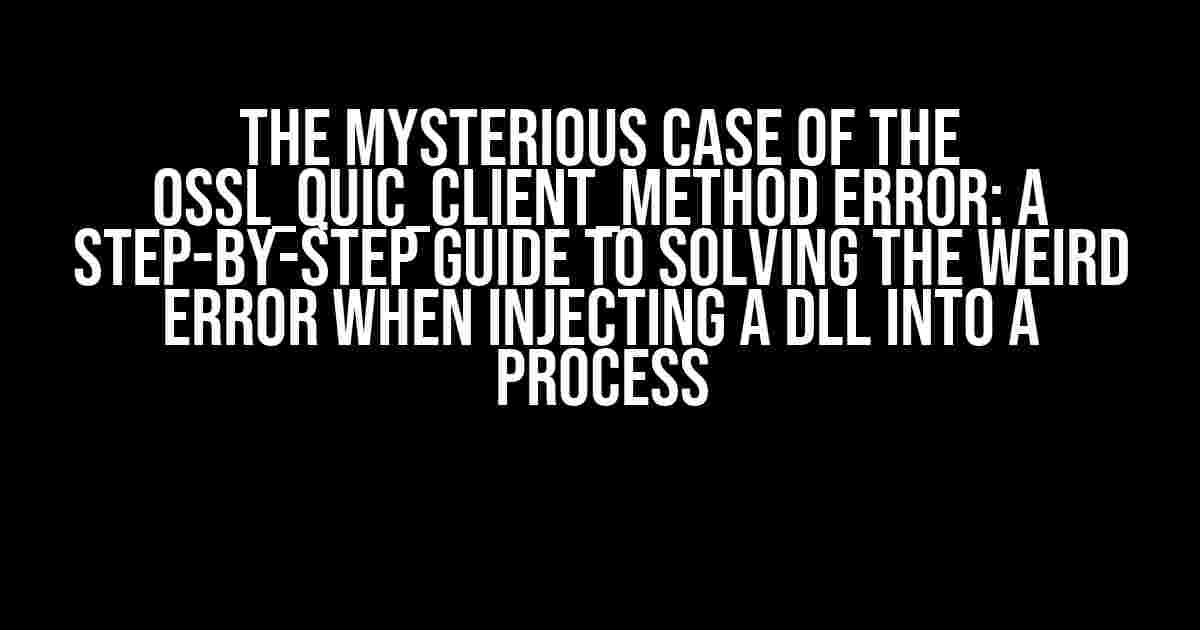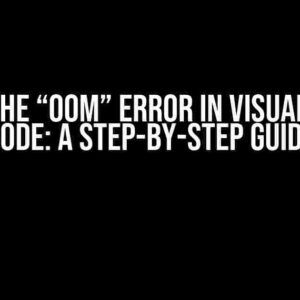Have you ever encountered the enigmatic error message “OSSL_QUIC_client_method could not be located in libcurl-4.dll” when attempting to inject a DLL into a process? You’re not alone! This error has left many developers scratching their heads, wondering what dark sorcery is at play. Fear not, dear reader, for we’re about to embark on a thrilling adventure to unravel the mystery of this cryptic error.
What’s Behind the Error?
Before we dive into the solution, let’s take a step back and understand what’s causing this error. The OSSL_QUIC_client_method function is part of the OpenSSL library, which is used by libcurl-4.dll to establish secure connections. When you inject a DLL into a process, it’s possible that the DLL is not properly linked or loaded, resulting in the error.
To make matters more complicated, the libcurl-4.dll library might be using an older version of OpenSSL, which could be causing compatibility issues. It’s a classic case of “DLL hell,” where different versions of the same library are causing conflicts.
Step 1: Verify the DLL Injection
The first step in solving this error is to ensure that the DLL injection is properly configured. Here are a few things to check:
- Verify that the DLL is correctly loaded into the target process using a tool like Process Explorer or API Monitor.
- Check that the DLL is not already loaded by another process, which could be causing conflicts.
- Make sure that the DLL is compiled with the correct architecture (x86 or x64) to match the target process.
Step 2: Update libcurl-4.dll to the Latest Version
One possible solution is to update libcurl-4.dll to the latest version, which might resolve the compatibility issues with OpenSSL. You can download the latest version of libcurl-4.dll from the official website or use a package manager like vcpkg.
Here’s an example of how to update libcurl-4.dll using vcpkg:
vcpkg install curl:x86-windows vcpkg install curl:x64-windows
Make sure to update both the x86 and x64 versions of libcurl-4.dll to ensure compatibility with different architectures.
Step 3: Verify OpenSSL Version
The next step is to verify that the OpenSSL version used by libcurl-4.dll is compatible with the OSSL_QUIC_client_method function. You can check the OpenSSL version by using the following command:
openssl version
Verify that the OpenSSL version is at least 1.1.1, which is the minimum required version for the OSSL_QUIC_client_method function. If you’re using an older version, you might need to update OpenSSL to the latest version.
Step 4: Configure the DLL to Use the Correct OpenSSL Version
Once you’ve verified the OpenSSL version, you need to configure the DLL to use the correct version. You can do this by setting the OpenSSLdirectory environment variable before loading the DLL.
Here’s an example of how to set the OpenSSL directory environment variable in C++:
#includeint main() { SetEnvironmentVariable("OPENSSLDIR", "C:\\Path\\To\\OpenSSL\\Bin"); LoadLibrary("libcurl-4.dll"); // ... }
Replace “C:\\Path\\To\\OpenSSL\\Bin” with the actual path to the OpenSSL bin directory.
Step 5: Try a Different libcurl-4.dll Implementation
If the above steps don’t resolve the issue, you might need to try a different implementation of libcurl-4.dll. There are several alternatives available, such as:
- curl-impersonate: A drop-in replacement for libcurl-4.dll that provides improved performance and compatibility.
- libcurl-7.dll: A newer version of libcurl that might resolve the compatibility issues with OpenSSL.
These alternatives might require changes to your code or configuration, so be sure to check their documentation for more information.
Conclusion
Solving the “OSSL_QUIC_client_method could not be located in libcurl-4.dll” error requires a combination of detective work and troubleshooting. By following these steps, you should be able to resolve the issue and successfully inject the DLL into the process.
Remember to:
- Verify the DLL injection configuration
- Update libcurl-4.dll to the latest version
- Verify the OpenSSL version and configure the DLL to use the correct version
- Try a different libcurl-4.dll implementation if necessary
With patience and persistence, you’ll be able to overcome this cryptic error and unlock the secrets of DLL injection.
Bonus Tips and Tricks
Here are some additional tips and tricks to help you troubleshoot and resolve the issue:
| Tips and Tricks | Description |
|---|---|
| Use Dependency Walker | Dependency Walker is a tool that helps you analyze the dependencies of a DLL or executable. It can help you identify missing or incompatible libraries. |
| Check for Conflicting DLLs | Verify that there are no conflicting DLLs loaded into the process, which could be causing issues. |
| Use a DLL Loader Library | Consider using a DLL loader library like LoadLibraryEx or DLL Loader to simplify the DLL injection process. |
By following these steps and tips, you’ll be well on your way to resolving the “OSSL_QUIC_client_method could not be located in libcurl-4.dll” error and injecting the DLL into the process successfully.
Frequently Asked Question
Are you stuck with the weird error when injecting a DLL into a process, and OSSL_QUIC_client_method could not be located in libcurl-4.dll? Worry not, we’ve got you covered!
Q1: What is OSSL_QUIC_client_method, and why is it causing an error?
OSSL_QUIC_client_method is a function in the libcurl-4.dll library, which is responsible for handling QUIC (Quick UDP Internet Connections) protocol. The error occurs when the injected DLL can’t find this function, often due to version mismatches or missing dependencies.
Q2: Why am I getting this error while injecting a DLL into a process?
When you inject a DLL into a process, it expects to find the required functions and dependencies. If the DLL is compiled against a different version of libcurl-4.dll or has incompatible dependencies, the error occurs. Make sure to use the correct version of libcurl-4.dll and its dependencies.
Q3: How do I fix the OSSL_QUIC_client_method not found error?
To fix the error, try the following: Update libcurl-4.dll to the latest version, ensure the correct version of libcurl-4.dll is in the system’s PATH, or recompile the injected DLL against the correct version of libcurl-4.dll. Also, verify that the dependencies are properly installed and configured.
Q4: Can I use an older version of libcurl-4.dll to fix the error?
While using an older version of libcurl-4.dll might seem like a quick fix, it’s not recommended. Older versions might have security vulnerabilities, and compatibility issues can still occur. It’s better to update to the latest version or ensure you’re using the correct version that matches the injected DLL’s dependencies.
Q5: What if I’m still encountering the error after trying the above solutions?
If you’ve tried the above solutions and still encounter the error, it’s likely due to a specific issue with your project’s setup or configuration. Try debugging the DLL injection process, verify the system’s PATH and environment variables, or seek help from a developer community or a Windows API expert.





